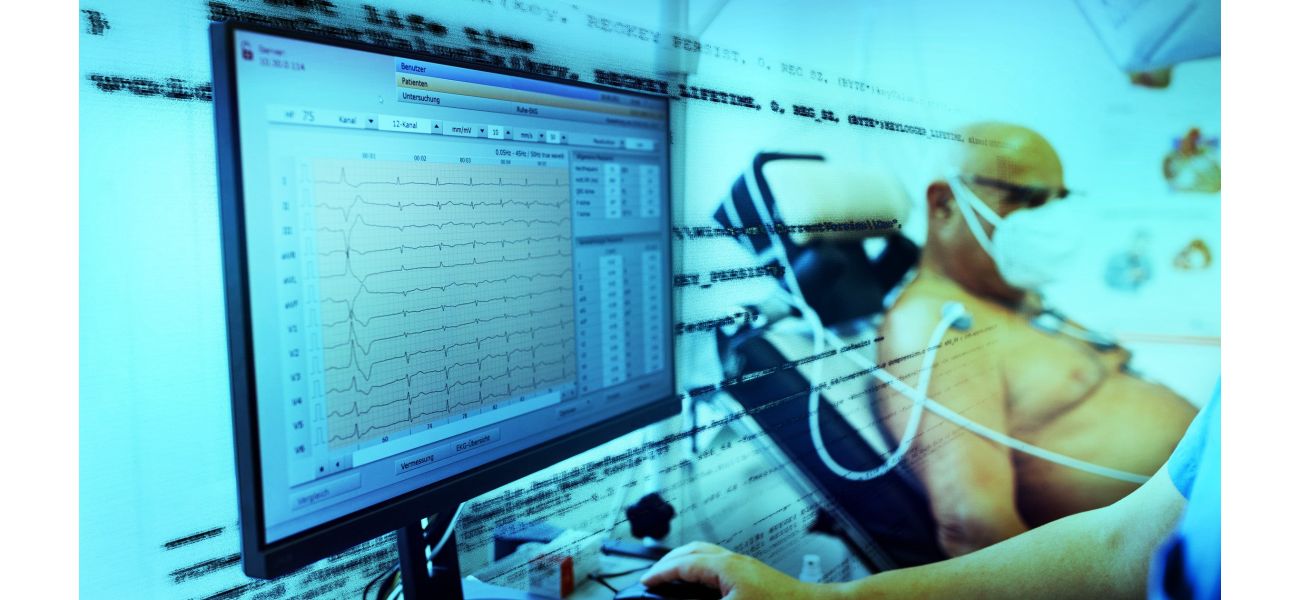Advanced AI may soon predict premature death for individuals.
Patients also need to trust AI, not just doctors.
October 23rd 2024.

Doctors are becoming increasingly reliant on AI technology to help them with their work. In fact, there is now a new type of doctor called Dr AI, who will be available to see patients. The National Health Service (NHS) is planning to test a groundbreaking AI system that has the ability to predict a person's risk of developing diseases and dying early. This "superhuman" tool, known as Aire, uses the results of a simple heart test to alert doctors to patients who may need further testing for potential heart problems.
If the trials are successful, Aire will become a common feature in the NHS within the next five years. While we have already seen AI technology being used for tasks such as generating images and videos, having conversations, and distinguishing between different products, now experts hope to apply this technology to better understand the human body and fight diseases. Aire does this by analyzing the results of electrocardiogram (ECG) tests. By looking at a person's heart rate, rhythm, and electrical activity, the test can diagnose a range of conditions, from heart disease in children to heart attacks in adults.
ECG tests are a go-to method for doctors to check for any issues with a person's heart. However, the AI technology used in Aire can provide a deeper insight into a patient's heart, using techniques that doctors would not typically be able to perform, such as examining their genetic information. The researchers behind Aire claim that it can not only predict a person's risk of dying, but also the time frame in which this may happen. By creating a "survival curve" using just one ECG test, Aire can provide a more accurate prediction of a person's health.
The first trial of Aire will take place in the middle of 2025 at the Imperial College Healthcare NHS Trust and Chelsea and Westminster Hospital NHS Foundation Trust. Hundreds of patients will participate in this trial, with more hospitals expected to join in the future. Dr Fu Siong Ng, a reader in cardiac electrophysiology at Imperial College London and consultant cardiologist at Imperial College Healthcare NHS Trust, explains that there will be several different studies to test the accuracy of Aire in diagnosing various conditions. Once this has been established, the next step will be to see if Aire can actually help improve a patient's health outcome.
It is estimated that about one in five doctors already use AI chatbots, such as ChatGPT, in their clinical practice. These chatbots can assist doctors with tasks like writing up letters for patients or diagnosing illnesses. According to a survey by The Health Foundation, about half of the public support the use of AI for patient care. However, there are also concerns that relying too heavily on AI could lead to lower quality care, as these systems may provide incorrect or incomplete medical information.
Dr Arunashis Sau, a British Heart Foundation clinical research fellow at Imperial College London's National Heart and Lung Institute and cardiology registrar at Imperial College Healthcare NHS Trust, reassures that Aire is not meant to replace doctors entirely. Instead, it is intended to be a "superhuman" tool that can assist doctors in identifying patients who may be at a higher risk of developing health issues. A study from January has already shown that Aire was able to accurately predict a patient's risk of death in the 10 years following their ECG in 78% of cases.
Dr Sau explains that the ECG test is a common and inexpensive test, but with the help of Aire, it can be used to guide further testing and potentially reduce a person's risk of adverse health outcomes. He clarifies that the goal of Aire is not to speed up or replace what doctors can do, but rather to do something that they cannot do by themselves. Trust is a crucial factor when it comes to using AI in healthcare, and Dr Sau emphasizes that both doctors and patients need to trust this technology. This trust will be built through the rigorous testing and validation of Aire's accuracy and effectiveness.
If the trials are successful, Aire will become a common feature in the NHS within the next five years. While we have already seen AI technology being used for tasks such as generating images and videos, having conversations, and distinguishing between different products, now experts hope to apply this technology to better understand the human body and fight diseases. Aire does this by analyzing the results of electrocardiogram (ECG) tests. By looking at a person's heart rate, rhythm, and electrical activity, the test can diagnose a range of conditions, from heart disease in children to heart attacks in adults.
ECG tests are a go-to method for doctors to check for any issues with a person's heart. However, the AI technology used in Aire can provide a deeper insight into a patient's heart, using techniques that doctors would not typically be able to perform, such as examining their genetic information. The researchers behind Aire claim that it can not only predict a person's risk of dying, but also the time frame in which this may happen. By creating a "survival curve" using just one ECG test, Aire can provide a more accurate prediction of a person's health.
The first trial of Aire will take place in the middle of 2025 at the Imperial College Healthcare NHS Trust and Chelsea and Westminster Hospital NHS Foundation Trust. Hundreds of patients will participate in this trial, with more hospitals expected to join in the future. Dr Fu Siong Ng, a reader in cardiac electrophysiology at Imperial College London and consultant cardiologist at Imperial College Healthcare NHS Trust, explains that there will be several different studies to test the accuracy of Aire in diagnosing various conditions. Once this has been established, the next step will be to see if Aire can actually help improve a patient's health outcome.
It is estimated that about one in five doctors already use AI chatbots, such as ChatGPT, in their clinical practice. These chatbots can assist doctors with tasks like writing up letters for patients or diagnosing illnesses. According to a survey by The Health Foundation, about half of the public support the use of AI for patient care. However, there are also concerns that relying too heavily on AI could lead to lower quality care, as these systems may provide incorrect or incomplete medical information.
Dr Arunashis Sau, a British Heart Foundation clinical research fellow at Imperial College London's National Heart and Lung Institute and cardiology registrar at Imperial College Healthcare NHS Trust, reassures that Aire is not meant to replace doctors entirely. Instead, it is intended to be a "superhuman" tool that can assist doctors in identifying patients who may be at a higher risk of developing health issues. A study from January has already shown that Aire was able to accurately predict a patient's risk of death in the 10 years following their ECG in 78% of cases.
Dr Sau explains that the ECG test is a common and inexpensive test, but with the help of Aire, it can be used to guide further testing and potentially reduce a person's risk of adverse health outcomes. He clarifies that the goal of Aire is not to speed up or replace what doctors can do, but rather to do something that they cannot do by themselves. Trust is a crucial factor when it comes to using AI in healthcare, and Dr Sau emphasizes that both doctors and patients need to trust this technology. This trust will be built through the rigorous testing and validation of Aire's accuracy and effectiveness.
[This article has been trending online recently and has been generated with AI. Your feed is customized.]
[Generative AI is experimental.]
0
0
Submit Comment





